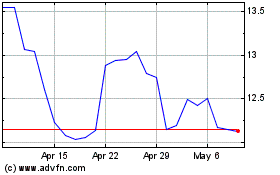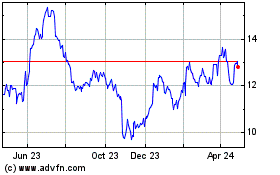Tesla Motors Files for a Dealership License in Michigan
February 01 2016 - 6:10PM
Dow Jones News
Tesla Motors Inc. filed an application for a dealership license
in Michigan, setting up a potential legal fight over the state's
ban on selling cars directly to consumers.
The Palo Alto. Calif., electric-car maker filed the application
in November for permission to open a dealership and service center
in Michigan, home to longtime car makers such as General Motors Co.
and Ford Motor Co.
Michigan's Secretary of State, the state agency that handles
dealership licenses, has been reviewing the application and
recently received more documents from Tesla, said Fred Woodhams, an
agency spokesman. He said it would take a month or more to decide
on the application.
Michigan about a year ago passed a stiffer law prohibiting car
makers from selling directly to customers in the state without an
independent dealer intermediary. Tesla has railed against such
dealer-franchise laws, calling them anticompetitive. Tesla owns its
own dealerships and allows customers to order vehicles online
directly from the company, something that other manufacturers are
prohibited from doing.
A denial from Michigan could prompt Tesla to pursue additional
legal avenues to fight the law.
"Tesla is committed to being able to serve its customers in
Michigan and is working with the legislature to accomplish that.
The existing law in Michigan is very harmful to consumers," a Tesla
spokeswoman said. "Tesla will take all appropriate steps to fix
this broken situation."
The Federal Trade Commission on Jan. 19 sponsored a day-long
series of panel discussions about automotive retailing with much
of the focus on Tesla and Elio Motors, another company aiming to
sell cars directly to customers. Elio is working on a
three-wheeled, single-occupant car it claims will get 84 miles a
gallon.
Daniel Goldberg, a Boston lawyer with Morgan Lewis & Bockius
LLP, sat on one panel at the FTC event, which also featured many
economists. Mr. Goldberg said dealer-franchise laws that prohibit
direct sales could potentially be challenged as unconstitutional.
Tesla previously has argued that such laws run afoul of
Congress's constitutional power to regulate interstate
commerce.
Tesla several years ago said it would consider a federal lawsuit
to resolve the issue if it couldn't come to an arrangement with
individual states. It has fought battles in nearly every state in
the U.S. with associations that represent car dealers. These
associations have supported legislation that aims to prevent Tesla
from selling vehicles directly to consumers. They also have fought
to keep on the books existing laws that prevent Tesla from running
its own dealerships.
In some cases, lawmakers have come to a compromise with Tesla
where they have banned all other companies from selling directly,
but have allowed Tesla to have a limited number of
manufacturer-owned dealerships.
Michigan, along with Texas, is among a small group of states
that have a flat prohibition on any direct sales. The laws were
created to prevent car makers from building their own stores that
would then compete with independent dealerships. Such
competition could potentially undercut independent dealerships'
prices and undermine investments made in their stores, according to
lawyers and economists who have scrutinized dealer-franchise
laws.
Write to Mike Ramsey at michael.ramsey@wsj.com
(END) Dow Jones Newswires
February 01, 2016 17:55 ET (22:55 GMT)
Copyright (c) 2016 Dow Jones & Company, Inc.
Ford Motor (NYSE:F)
Historical Stock Chart
From Mar 2024 to Apr 2024

Ford Motor (NYSE:F)
Historical Stock Chart
From Apr 2023 to Apr 2024
